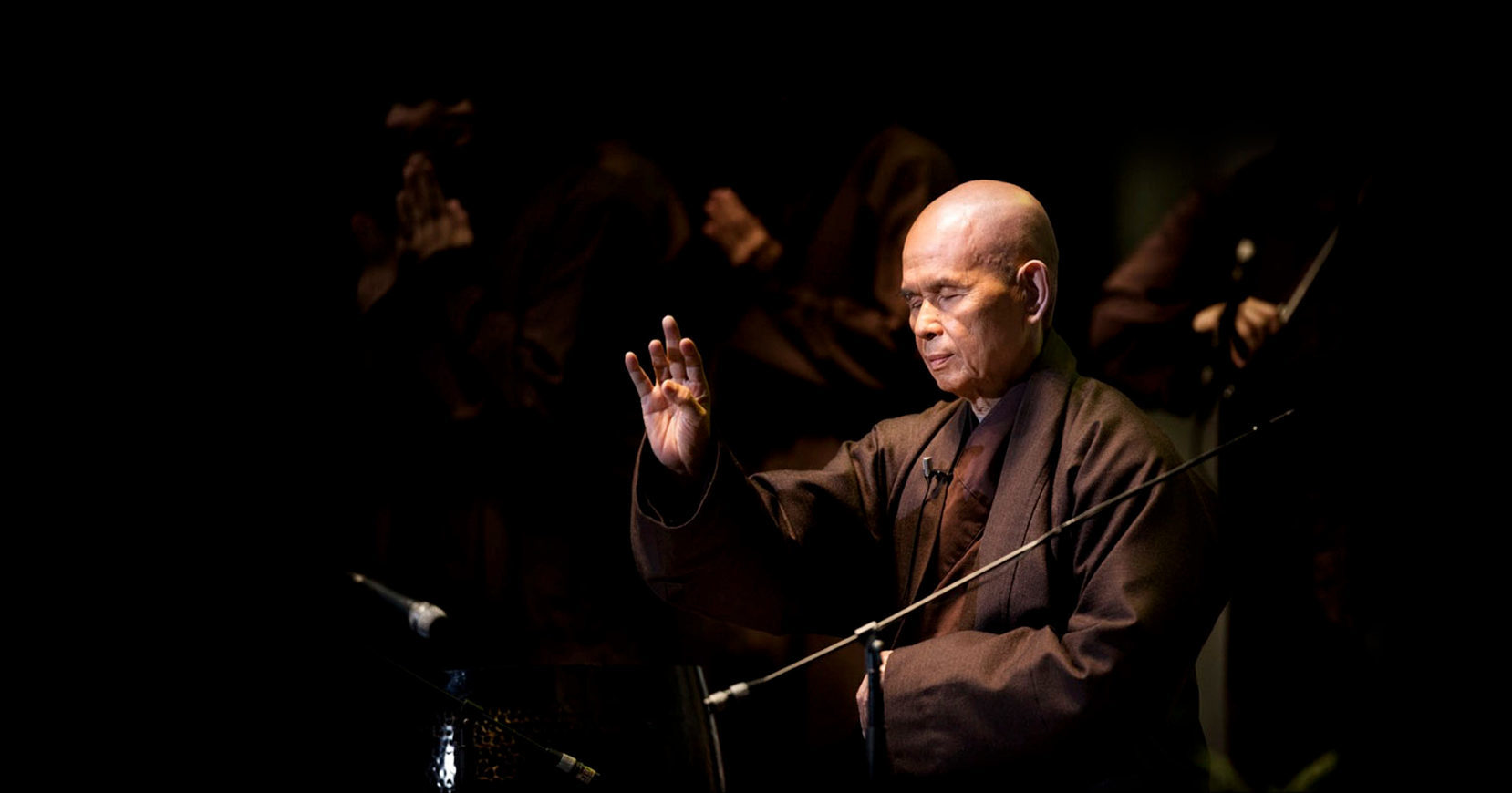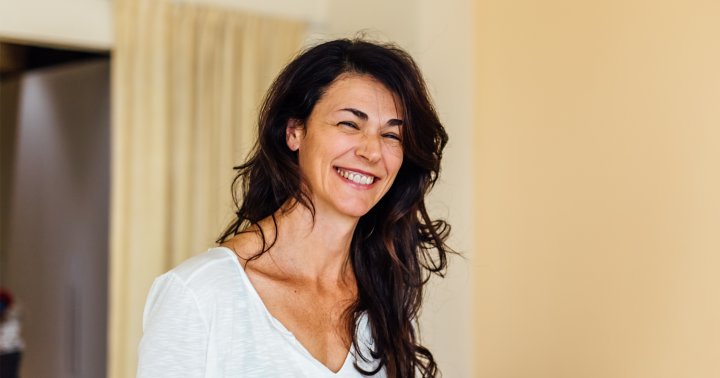Accepting yourself as you are: Practicing the Sixth Mantra
Original Vietnamese title:“Chấp Nhận Chính Mình – Thực Tập Câu Linh Chú Thứ Sáu [Thực Tập Căn Bản Làng Mai] – TS Nhất Hạnh” Lower Hamlet, Plum Village – Jan 15, 2012 If we can accept ourselves, seeing who...

Original Vietnamese title:“Chấp Nhận Chính Mình – Thực Tập Câu Linh Chú Thứ Sáu [Thực Tập Căn Bản Làng Mai] – TS Nhất Hạnh”
Lower Hamlet, Plum Village – Jan 15, 2012
If we can accept ourselves, seeing who we really are, it’ll be easy for us to accept other people and see who they really are. But if we cannot accept ourselves, we will not be able to accept other people.
Many of us find ourselves hard to accept. We have the complex of inferiority. We get angry with ourselves. When we cannot accept ourselves, how can we accept other people? And if we can’t learn to accept each other, we can’t live in harmony and happiness with each other.
So the happiness of a sangha depends on the practice called “self-acceptance”. We should go like this, “I accept myself just the way I am. I am a stream of continuation. Because my parents, grandparents, and my blood ancestors are the way they are, I am the way I am. I accept this fact wholeheartedly. In me there are talents. In me there are weaknesses. And I accept all of the talents and weaknesses in me.”
Admitting that to myself doesn’t mean I’m powerless. With my practice of mindfulness, I can develop these talents in me. With the practice of mindfulness, I can learn to transform, bit by bit, little by little, these weaknesses in me. These two practices go in tandem.
On the one hand, I accept what I’ve been inherited, what’s been passed on to me, I accept it as an unbroken stream of transmission. On the other hand, I have a wish to make it better. So this self-acceptance and this wish can go hand in hand.
So when someone looks at us and praises us or criticizes us, if we have this insight, we won’t be swayed by such a remark. Because when we look deeply into ourselves, we recognize both the positives and the negatives. It’s certain that we have talents, and at the same time weaknesses – it’s the same with everyone.
But these talents and weaknesses that we have don’t necessarily belong to a separate self-entity. They’re just there because of the unbroken line of transmission. Just like a river. The river’s like that because the many creeks that run into it are like that. We have to learn to accept all. This acceptance brings us peace. We should learn to accept that we have virtues and talents, as well as shortcomings. This is very important.
When somebody makes a comment, let’s say, “You’re so talented!“, we should then … learn to respond in such a way that’s appropriate to the Buddha’s teachings. We can say, “You are partly right. Because in me there are many positive things, certainly. But you should also know that in me there are also weaknesses and shortcomings. So what you’ve just said, your praise, is only partly right.“
With that response, we break away from the complex of superiority. Without that insight in mind, when people continue being generous with their praises for us, we’ll think we’re invincible. So when someone praises us, we have to say to ourselves, “You are partly right. I do have a few good things. But just so you know, I also have numerous shortcomings.”
Though we don’t say it out loud, we should have that little pep talk to ourselves. When someone praises us, we should learn to say, “You’re only partly right, my dear friend, because you haven’t seen all my weaknesses yet.” With that, we learn to remain humble, we don’t think highly of ourselves and we don’t spoil our own good qualities.
And now if someone criticizes us, “You are good for nothing. You have too many shortcomings,” we’ll respond in the same way. We’ll say, “That person’s only partly right.” “You are only partly right, dear friend. But I also have virtues and also talents in me.”
And at that moment, we can choose to communicate with that person verbally, or with our silence. But deep down inside, we should always remember this reminder, “What they say is only partly right.” “You are only partly right.” This is the sixth mantra.
This sixth mantra can be communicated verbally. But certainly, even though it might’ve already been communicated verbally, we should also say it silently to ourselves. When someone in the sangha comes and praises us, we should right away remember to recite this sixth mantra silently. “Thank you, dear friend, but you haven’t seen my shortcomings. You can only see part of the totality of the truth.” And we can also tell that person the same thing. It’s the truth.
Because once we accept ourselves, we already have peace in our heart. And once we can accept ourselves, we will be able to accept the other person. It only does wonders. We’ll no longer demand anything of the other person. We accept him or her just the way they are. But we also have a wish that he or she, through the practice of mindfulness, will be able to nourish what’s true, good, and beautiful in themselves and help weaken their shortcomings.
But this wish shouldn’t create pressure or make the other person feel judged. Because we treat ourselves like that, we’re aware that in us there are both positives and negatives, we accept both of those positive and negative parts in us. In our heart there is peace. And nobody forbids us from having a wish that with this practice, we can cultivate the positive, and with this practice, we will mitigate the negative. We have that wish for ourselves. And we wish the same for the other person.
For that reason, before criticizing or reprimanding a younger Dharma brother or sister, we have to keep this in mind: First, accept him or her the way they are. Instead of saying, “You are good for nothing”, we should say, “There’s many good things about you, but there’s also a few shortcomings. I wish you can practice in a way that these shortcomings can be mitigated.“ Putting it this way will bring the other person more happiness. Because in the Sangha, there’s some members who are very fragile, very sensitive, who’s really afraid of receiving feedback from the Sangha (Shining Light practice).
Once we can really accept ourselves, once we can really accept our own weaknesses and shortcomings, we naturally have peace in our heart. And when we look at someone, we can easily accept them.
When we can accept someone, in our eyes, there’s sparks of acceptance. And when we look at someone that way, they’ll feel very happy. But if we look at them with the eyes of scrutiny or criticism, that person will suffer a great deal. For that reason, each of us should have this look of acceptance first. “Dear elder brother, elder sister, younger sibling, I accept you as you are, brother / sister. I accept you as you are.“
Our eyes should emanate that energy of acceptance. Even if that person has weaknesses, we just wish that they can transform. We have to see that even though that person has weaknesses, they do have positive qualities in them. None of us has no positive qualities and talents.
So when we get criticized by someone, we have to base our view on this insight to be able to say, “He is partly right. Only partly right. He has not seen the other part of me.” That person has only seen part of you, not the totality of you. It’s the truth. How can we see the totality of the other person when we even haven’t been able to see the totality of ourselves? So living in a Sangha, we should have this kind of humility in us.
We have to see that we do not have separate selves, that we’re the continuation of the lineage of our blood ancestors. All the talents and virtues that we have, don’t think they belong to us alone, or to a separate self. All these qualities are in fact transmitted to us by our ancestors. We should learn to see this. We should bring up this feeling of gratitude that our blood ancestors have transmitted to us the seeds of talents, of virtues.
If we have a body that’s healthy and beautiful, don’t pride ourselves on it. Because it belongs to our ancestors. Not us. And if we have several shortcomings, a few bad habits, they’re also transmitted to us by our ancestors. Don’t get caught in a separate self, and then get angry with ourselves, “Why am I like this?“ Because the more important thing is acceptance. Acceptance.
We have to accept ourselves. And like I’ve already shared, accepting ourselves doesn’t mean there’s nothing we can do to save ourselves. We can still have wishes. With our practice, we can cultivate our talents and positive qualities. With our practice, we can weaken our shortcomings.
And if we can treat ourselves this way, we can begin treating the other person this way, too. We’ll be able to look at the other person with the eyes of acceptance. “Dear brother, dear sister, I accept you as you are. You are my brother, you are my sister.” The other person will be very happy.
But that doesn’t mean we don’t have wishes for them. We have wishes for them the way we have wishes for ourselves. We wish that person will develop what’s good and virtuous in them and possibly transform several shortcomings in them.
So the mantra that Thay recommend using is, “You are partly true. You are partly right.” When they compliment us, it’s partly right. And when they criticize us, it’s also partly right. Because all of us have weaknesses, and all of us have talents. Don’t let other people’s praises or criticism make you suffer.
And when we praise or criticize someone, we have to also do it with a lot of caution. We only make our wishes known, instead of criticizing or praising. Don’t make the other person’s self-importance puff up or expand. And also don’t let our self-importance expand.
In summary, first, we say that there’s not a separate self. There’s no self, there’s not a separate self-entity, but only a stream of continuation. A stream of continuum. It uses the image of a river. This is what we should always keep in mind: Look at ourselves as a river, as a continuation of all our ancestors, our parents, and grandparents – not a separate self. We are our ancestors, we are our grandparents, we are our parents.
Secondly, we have to learn to accept all … the … positive and negative in that stream of continuum. Like a river which has its water coming from of many creeks and waterways. And sometimes we see as the river flows, one side is clear water, and another side, muddy water. We have to accept both. Because the … streamlets that enter the river was like that, the river will be like that. We accept. We accept both the good and bad in the stream.
And thirdly, we have to have aspirations. This is our aspiration. What aspirations? The aspiration to build up and transform. To build up the positive currently flowing in that stream of continuum. And to transform or purify the elements that are negative in us. That’s what we do for ourselves in terms of helping ourselves, practicing for ourselves.
Once we can do that, the relationships between us and other people will naturally become better. Because when we look at someone, we also see they do not have a separate self. They are but a stream of continuation.
If they have such and such talents, it’s because their ancestors have transmitted those to them. And if they happen to have shortcomings, or such and such negative seeds, it’s also because their ancestors have transmitted those to them. We have to accept that person as they are. Don’t demand them to be different. What matters most is to have this insight within us always.
When we have this insight, our eyes will naturally show our acceptance. “Dear brother, I accept you as you are.” “Dear sister, I accept you as you are.” And when we look at them this way, it’s the eyes of understanding and compassion. Because understanding is compassion. If we can look at someone with the eyes of acceptance, the other person will suffer much less.
It’s because among us, in our sangha, there’s some people who are a little bit sensitive. A look that’s a little bit judgmental is enough to make them quiver and suffer. Sometimes we don’t mean to judge or criticize but the other person thinks we do. It’s like a bird being shot with an arrow just for once mistaken a curve branch for a bow aiming at himself or herself.
And for that reason, for that reason, we have to be very careful. It’ll create a lot of suffering. That’s why we learn to look with the eyes of acceptance. Learn to look with the eyes of compassion. And we know that understanding leads to love and compassion.
We want to love. But without understanding how can we love? And understanding here means ‘seeing deeply’. Seeing what deeply? Seeing that the other person doesn’t have a separate self. That they are only a stream of transmission and continuation. That they’ve received all the positive and negative from the past. We have to learn to accept our Dharma siblings the way they are. We have to learn to accept our brothers and sisters the way they are. And we should verbalize it.
A few days ago in the Upper Hamlet, we ordained three novice monastic brothers. Yesterday, Thay walked them on a walking meditation down to Son Ha. When being accepted by the whole Sangha like this, we know there’s already understanding and love. We should make ourselves at home. When we know we’re accepted, it feels very happy.
For that reason, let us practice looking at all members of our sangha, of our big family, with the eyes of acceptance. “Dear brother, dear sister, I accept you as you are.“ However, that doesn’t mean we don’t have wishes for them. When we have a wish, we would say, “Dear Dharma sibling, you’re full of good and beautiful qualities that you should preserve and cultivate so you can be happier, and so can the sangha. You have a couple of shortcomings. You can ask the sangha … practice for yourself first, then ask for the sangha’s support to find ways to transform them bit by bit so you can be happier, and so can the sangha.“
If we can put it this way and look at them with these accepting eyes, the other person will not suffer, and the qualities of peace and happiness in the sangha will increase. Our eyes speak a lot. Sometimes we don’t say a word but our eyes speak. That’s why we need to have this understanding, so that our eyes can speak acceptance with the other person.
Because we are family, we live with each other, we have to learn to accept each other in order to be happy, in order to have the opportunity to bring happiness to other people.
So these three points are the points we use to contemplate for ourselves. When we can accept ourselves, we have peace and happiness in our hearts. When we can accept ourselves, we can accept other people. And the happiness of living in a community becomes a reality.
We should also contemplate these three points about other people. With our eyes, we show that we have this understanding. And with our speeches, we can also show the same thing.
For that reason, from now on, whenever there’s someone praising us, instead of feeling proud of ourselves, we say “Dear elder Dharma brother, you are partly right. I also have weaknesses in me.” And when someone criticizes us, we say, “Dear elder Dharma sister, you are only partly right, because I’m not that bad. Not completely bad. I still have many good things about me.” That’s the truth.
And this is the sixth mantra that we can practice with in silence. And it protects us. It doesn’t allow us to get hurt by criticism and comments. When someone is critical of us, recite this gatha silently. “You are partly right only, dear elder brother, dear elder sister.” And before we praise someone, or criticize someone, we know, that person will recite this gatha silently. So we should be really careful. That person will say, “You are only partly right.”
The original talk was given in Vietnamese, and this English translation is kindly provided by translator Nguyễn Thị Ngân Tuyền (Living Dharma of the Heart).

 Tfoso
Tfoso 
































